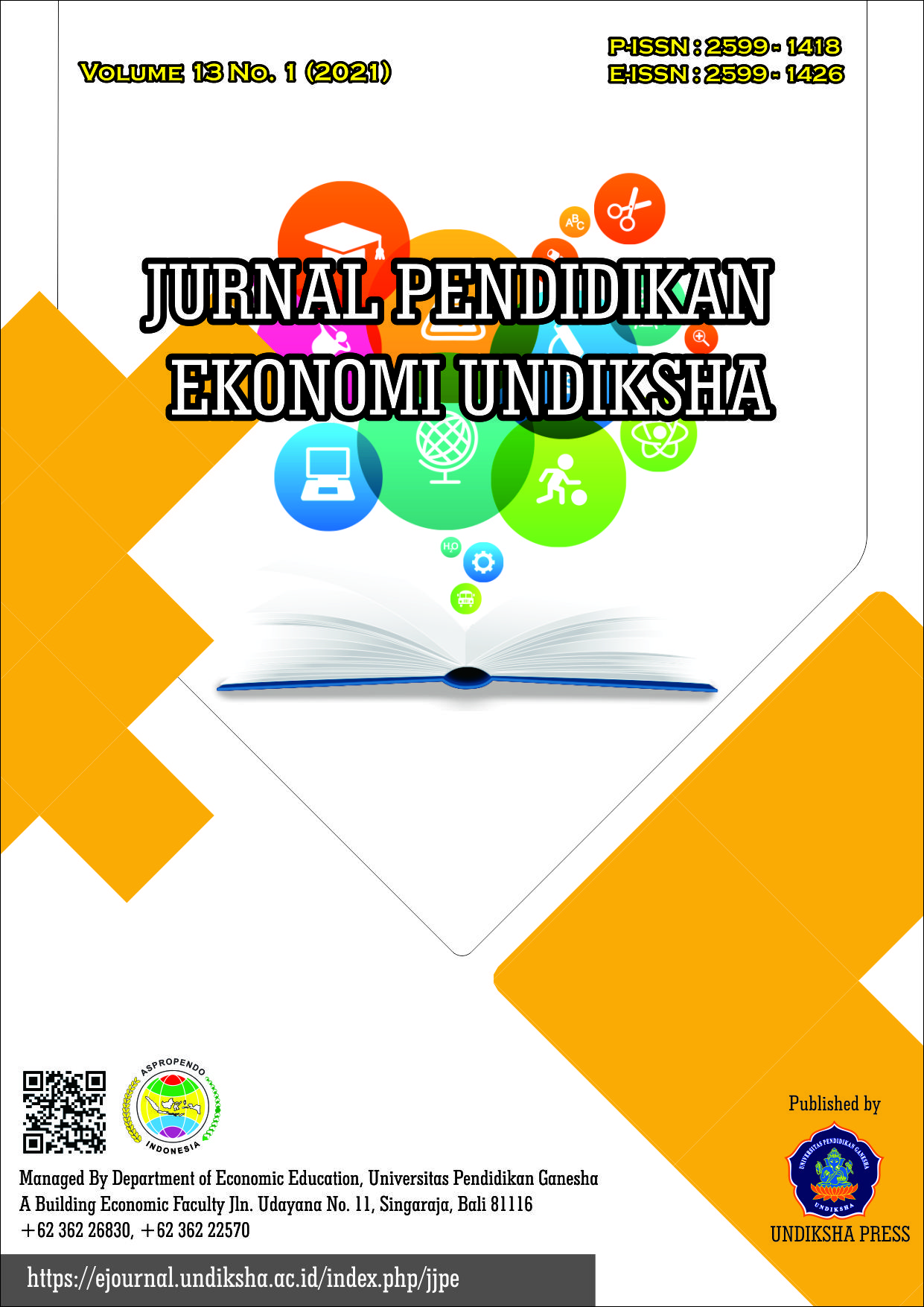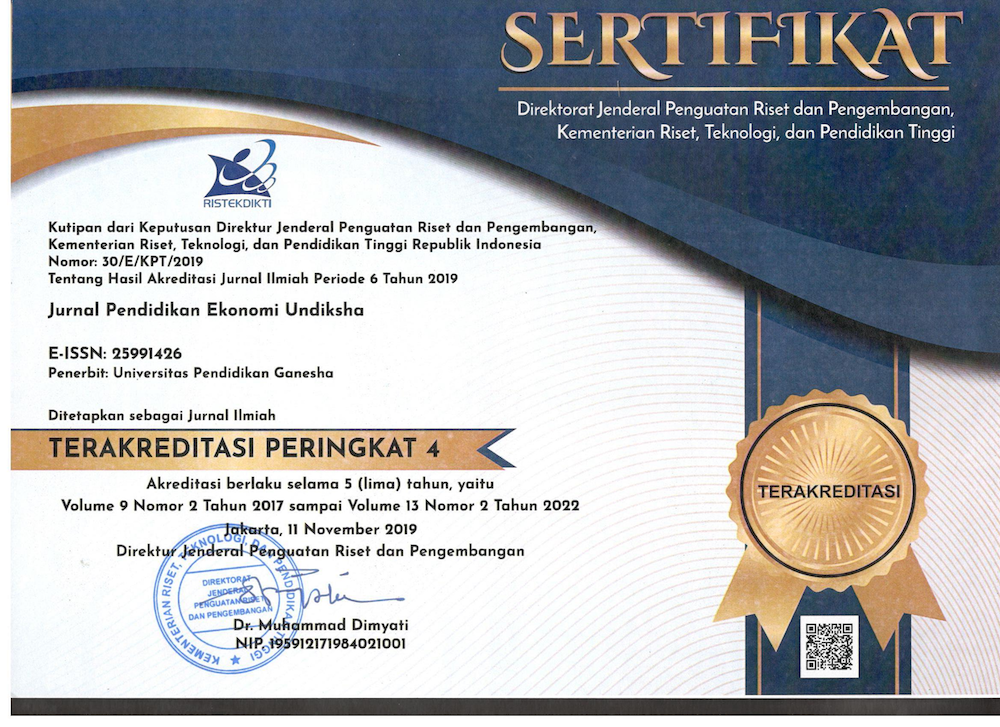Peran Kemandirian Belajar dalam Memediasi Pengaruh Motivasi Berprestasi terhadap Prestasi Belajar Mahasiswa Selama Pembelajaran Daring
DOI:
https://doi.org/10.23887/jjpe.v13i1.33910Keywords:
achievement motivation, independence learning, learning achievementAbstract
This study aims to analyze and examine the role of independent learning in mediating the effect of achievement motivation on student achievement during online learning. Respondents of this study were 158 active students of the Department of Economic Education, UNESA, batch 2018. Data collection techniques were through questionnaires and documentation, then the data were analyzed using the SEM (Structural Equation Modeling) test. The results of this study indicate that achievement motivation has a direct and significant effect on learning achievement. Achievement motivation has a direct and significant effect on learning independence. Learning independence has no direct and insignificant effect on learning achievement. and achievement motivation has an indirect effect on learning achievement through independent learning with a total value of 20%.References
Al-Rasyid, H. (1994). Teknik Penarikan Sampel dan Penyusunan Skala. Bandung: Pascasarjana Unpad.
Allen, B. K., Romney, G. W., Dey, P. P., & Romney, M. D. (2015). Collaborative Academic-Government Agile Development of a Cloud Prototype Fire Retardant Drop Log Application for Wildfire Management Bryan. Journal of Research in Innovative Teaching, 8(1), 99–115.
Baars, M., & Wijnia, L. (2018). The Relation between Task-Specific Motivational Profiles and Training of Self-Regulated Learning Skills. Learning and Individual Differences,. Learning and Individual Differences, 125–137. Retrieved from https://doi.org/10.1016/j.lindif.2018.05.007
Balapumi, R., & Aitken, A. (2012). Concepts and Factors Influencing Independent Learning in IS higher education. ACIS 2012 : Proceedings of the 23rd Australasian Conference on Information Systems, 1–10.
Chanah, S. N. (2011). Pengaruh kemandirian belajar dan keaktifan siswa terhadap prestasi belajar matematika. Retrieved from http://digilib.uin-suka.ac.id/5985/
Fitriana, S. (2015). Pengaruh Efikasi Diri, Aktivitas, Kemandirian Belajar Dan Kemampuan Berpikir Logis Terhadap Hasil Belajar Matematika Pada Siswa Kelas Viii Smp Negeri. Journal of Educational Science and Technology (EST), 1(2), 86–101. https://doi.org/10.26858/est.v1i2.1517
Fitriani, W., Haryanto, H., & Atmojo, S. E. (2020). Motivasi Berprestasi dan Kemandirian Belajar Mahasiswa saat Pembelajaran Daring. Jurnal Pendidikan: Teori, Penelitian, Dan Pengembangan, 5(6), 828–834. Retrieved from http://journal.um.ac.id/index.php/jptpp/article/view/13639
Ghozali, I. (2011). Aplikasi Analisis Multivariate dengan program SPSS. Semarang: Badan Penerbit Universitas Diponegoro.
Glynn, S. M., Taasoobshirazi, G., & Brickman, P. (2009). Science motivation questionnaire: Construct validation with nonscience majors. Journal of Research in Science Teaching, 46(2), 127–146. https://doi.org/10.1002/tea.20267
Guglielmino, P. J., Guglielmino, L. M., & Long, H. B. (1987). Self-directed learning readiness and performance in the workplace - Implications for business, industry, and higher education. Higher Education, 16(3), 303–317. https://doi.org/10.1007/BF00148972
Huang, M. B. (2008). Factors Influencing Self-directed Learning Readiness amongst Taiwanese Nursing Students. 1–290.
Husaini, M. (2014). Pemanfaatan Teknologi Informasi dalam Bidang Pendidikan (E-Education). Jurnall Mikotik, 2(1), 1–5.
Jegede, J. O. ., Jegede, R. T. ., & Ugodulunwa, C. A. . (1997). Effects of Achievement Motivation and study Habits on Nigerian Secondary School Students’ Academic Performance. The Journal of Psychology, 131(5), 523–529.
Keirns, J. L. (1999). Designs for Self Instruction: Principle, Process, and Issues in Developing Self-Directed Learning (4th ed.). Massachusetts: Allyn & Bacon.
Kusumadewi, R. R. (2014). Hubungan Efikasi Diri, Kemandirian Belajar Dan Motivasi Berprestasi Dengan Prestasi Belajar Mahasiswa. Digilib UNS.
Marvianto, R. D., Ratnawati, A., & Madani, N. (2020). Motivasi Berprestasi sebagai Moderator pada Peranan Kecerdasan Emosi terhadap Prestasi Akademik Mahasiswa. Jurnal Psikologi, 16(1), 74. https://doi.org/10.24014/jp.v16i1.9538
Mc. Clelland, D. C. (1961). The Achieving Society. New York: D. Van Nostrand Company, Inc.
McClelland. (1987). The Achieving Society.
Mckendry, S., & Boyd, V. (2012). Defining the “Independent Learner” in UK Higher Education: Staff and Students’ Understanding of the Concept. International Journal of Teaching and Learning in Higher EducatioN, 24(2), 209–220.
Piaget, J. (2002). Tingkat Perkembangan Kognitif. Jakarta: Gramedia.
Pilkington, O. A. (2018). Active Learning for an Online Composition Classroom : Blogging as an Enhancement of Online Curriculum. Journal of Educational Technology Systems, 47(2), 1–1. Retrieved from https://doi.org/10.1177/0047239518788278.
Rochimah, N., & Suryadi. (2018). Pengaruh Motivasi Berprestasi Dan Kepercayaan Diri Terhadap Belajar Mandiri Mahasiswa. Jurnal Pendidikan Dan Pengajaran, 01(01), 7–13.
Ros, V., Keo, O., & Sophal, P. (2012). Factors Promoting Independent Learning among Foundation Year Students. The Cambodian Reviews of Language Learning and Teaching, 2, 37–52.
Santrock, J. . (2004). Educational Psychology, 2ndedition (Psikologi Pendidikan, Edisi Kedua). (Terjemahan Tri Wibowo B.S). Jakarta.
Selvi, K. (2010). Motivating Factors in Online Courses. Procedia - Social and Behavioral Sciences, 2(2), 819–824. https://doi.org/https://doi.org/10.1016/j.sbspro.2010.03.110.
Singh, G., ’donoghue, J. O., & Worton, H. (2005). A Study Into The Effects Of eLearning On Higher Education. Journal of University Teaching & Learning Practice, 2(1), 13–24.
Slameto. (2013). Belajar dan Faktor-faktor yang Mempengaruhinya. Jakarta: PT. Raja Grafindo Persada.
Sobri, M., & Moerdiyanto. (2014). Pengaruh Kedisplinan dan Kemandirian Belajar Terhadap Hasil Belajar Ekonomi Madrasah Aliyah di Kecamatan Praya. Harmoni Sosial., 1(1), 43–56.
Sufatihah, I. (2018). Pengaruh Motivasi Berprestasi dan Kemandirian Belajar terhadap Prestasi Belajar Matematika Siswa. JKPM (Jurnal Kajian Pendidikan Matematika), 3(2), 157. https://doi.org/10.30998/jkpm.v3i2.2770
Sutama, Wahyudiyanto, E., & Narimo, S. (2018). Lingkungan Teman Sebayamemoderasi Pengaruh Penggunaan Teknologi Informasi, Disiplin Belajar, Dan Motivasi Berprestasi Terhadap Prestasi Akademik. Economic Education Analysis Journal, 7(2), 464–478.
Utami, R. (2019). Analisis Respon Mahasiswa terhadap Penggunaan Google Classroom pada Mata Kuliah Psikologi Pembelajaran Matematika. Prisma, Prosiding Seminar Nasional Matematika, 498–502.
Waskitoningtyas, R. S. (2020). Mahasiswa Pendidikan Matematika Universitas Balikpapan Selama Masa Covid-19. Konferensi Nasional Pendidikan, (12).
Winasih, S. P., Pawenang, S., & Suhendro. (2018). Dampak Efikasi Diri , Motivasi Pencapaian Prestasi dan Kemandirian Dalam Belajar Terhadap Prestasi Belajar Siswa. Indonesian Economics Business and Management Research, 1(1), 42–46.





